|
|
|
Sort Order |
|
|
|
Items / Page
|
|
|
|
|
|
|
| Srl | Item |
| 1 |
ID:
166760
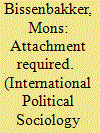

|
|
|
|
|
| Summary/Abstract |
Taking as its case the Danish “attachment requirement” (2000–2018), this article examines the way in which the biopolitical management of marriage migration has come to take the form of asserting national belonging. Although introduced as a tool for combatting “forced marriages,” the Danish attachment requirement did not purport to determinate the genuine character of love relationships but instead aimed at monitoring and predicting the national attachment of migrating spouses. Through an in-depth analysis of Danish Alien Acts from 2000 to 2018, I demonstrate how the attachment requirement placed an obligation on the applicants to orient themselves toward the Danish nation and society as opposed to other nations, symbolically and legally represented by the applicants’ next of kin and/or their relation to the so-called “ghetto.” Relying on the affective-phenomenological concept of orientation, I suggest that national attachment according to the Danish Aliens Act can be understood as a method for turning belonging into a juridical tool. This secures maximum flexibility for the state in bestowing and reworking rights to family reunification.
|
|
|
|
|
|
|
|
|
|
|
|
|
|
|
|
| 2 |
ID:
119050
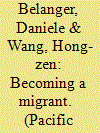

|
|
|
|
|
| Publication |
2013.
|
| Summary/Abstract |
Since the early 1990s several million men and women from Southeast Asia's lower socioeconomic classes have migrated to East Asia with a temporary worker visa or a spousal visa. This article is based on five years of ongoing fieldwork in migrants' communities of origin in rural Vietnam and in places of destination in Taiwan, South Korea and Japan. The authors make three contributions: first, they argue that the categorization of migrants as either "workers" or "wives" in research obscures the complex trajectories and motives involved in the process of "becoming a migrant." Second, they challenge studies that unquestioningly invoke social network approaches to migration. Instead, social networks should be regarded as a double-edged sword for emigrants because personal networks are embedded in a powerful migration industry. Third, they contend that migration outcomes and levels of success are, in part, influenced by processes taking place before departure. This article sheds light on the tension between migrants' agency and the structural constraints faced by candidates seeking to migrate from Vietnam, and from Southeast Asia more broadly.
|
|
|
|
|
|
|
|
|
|
|
|
|
|
|
|
| 3 |
ID:
117930
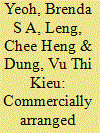

|
|
|
|
|
| Publication |
2013.
|
| Summary/Abstract |
Globalization and increased mobilities have multiplied cross-border transactions not only in the economic sphere but have also a major impact on human relationships of intimacy. This can be seen in the increased volume of differently mediated forms of international marriage, not just straddling 'east' and 'west', but within Asia and across different ethnicities and nationalities. International marriage raises a host of social issues for countries of origin and destination, including challenges relating to the citizenship status and rights of the marriage migrant. This paper examines the negotiation of citizenship rights in the case of commercially matched marriage migrants - namely Vietnamese women who marry Singaporean men and migrate to Singapore as 'foreign brides'. While they are folded into the 'family' - what is often thought of as the basic building block of the nation in Asian societies - they are not necessarily accorded full incorporation into the 'nation' despite Singapore's claims to multiculturalism. This is particularly salient at a point when cross-nationality, cross-ethnicity marriages between Singapore citizens and non-citizens are on the increase, accounting for over a third of marriages registered in Singapore in recent years. Vietnamese women who marry Singaporeans are positioned within the nation-state's citizenship regime as dependents of Singaporean men, having to rely on the legitimacy of the marriage relationship as well as the whims of their husbands in negotiating their rights vis-à-vis the Singapore state. Drawing on interviews and ethnographic work with 20 Vietnamese women who are commercially matched marriage migrants, the paper first focuses on the vulnerable positions these women find themselves, particularly given difficulties in forging their own support networks as well as weaknesses of the civil society sector in what has been called an 'illiberal democracy' characterized by a political culture of 'non-resistance'. The paper then goes on to examine the way they negotiate rights to residency/citizenship, work and children within webs of asymmetrical power relations within the family and the nation-state. We draw on our findings to show that citizenship is 'a terrain of struggle' within a multicultural nation-state shaped by social ideologies of gender, race and class and negotiated on an everyday basis within spheres of family intimacy.
|
|
|
|
|
|
|
|
|
|
|
|
|
|
|
|
| 4 |
ID:
117931
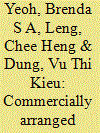

|
|
|
|
|
| Publication |
2013.
|
| Summary/Abstract |
Globalization and increased mobilities have multiplied cross-border transactions not only in the economic sphere but have also a major impact on human relationships of intimacy. This can be seen in the increased volume of differently mediated forms of international marriage, not just straddling 'east' and 'west', but within Asia and across different ethnicities and nationalities. International marriage raises a host of social issues for countries of origin and destination, including challenges relating to the citizenship status and rights of the marriage migrant. This paper examines the negotiation of citizenship rights in the case of commercially matched marriage migrants - namely Vietnamese women who marry Singaporean men and migrate to Singapore as 'foreign brides'. While they are folded into the 'family' - what is often thought of as the basic building block of the nation in Asian societies - they are not necessarily accorded full incorporation into the 'nation' despite Singapore's claims to multiculturalism. This is particularly salient at a point when cross-nationality, cross-ethnicity marriages between Singapore citizens and non-citizens are on the increase, accounting for over a third of marriages registered in Singapore in recent years. Vietnamese women who marry Singaporeans are positioned within the nation-state's citizenship regime as dependents of Singaporean men, having to rely on the legitimacy of the marriage relationship as well as the whims of their husbands in negotiating their rights vis-à-vis the Singapore state. Drawing on interviews and ethnographic work with 20 Vietnamese women who are commercially matched marriage migrants, the paper first focuses on the vulnerable positions these women find themselves, particularly given difficulties in forging their own support networks as well as weaknesses of the civil society sector in what has been called an 'illiberal democracy' characterized by a political culture of 'non-resistance'. The paper then goes on to examine the way they negotiate rights to residency/citizenship, work and children within webs of asymmetrical power relations within the family and the nation-state. We draw on our findings to show that citizenship is 'a terrain of struggle' within a multicultural nation-state shaped by social ideologies of gender, race and class and negotiated on an everyday basis within spheres of family intimacy.
|
|
|
|
|
|
|
|
|
|
|
|
|
|
|
|
| 5 |
ID:
187073


|
|
|
|
|
| Summary/Abstract |
Addressing research on migration governance, this article examines German pre-integration courses offered to Turkish marriage migrants in Istanbul. The courses were implemented in response to growing concern about the perceived poor integration of Muslim migrants and a high number of forced marriages. I argue that these courses are a micro form of biopolitical governance. Specifically, they are an attempt to generate internalized ways of being and knowing that are desired by the state, which I call ‘membership cultivation.’ As such, the courses are not precisely aimed at restricting migration as in other pre-integration measures, nor are they mainly reinforcing symbolic boundaries and teaching liberalism as in post-migration German civic integration courses. Rather, the courses attempt to re-make migrants with regards to morality, culture and gender. Using participant observation and in-depth interviews, this research examines the disciplinary mechanisms targeting migrants’ transformation to enhance our understanding of the biopolitics of pre-integration governance.
|
|
|
|
|
|
|
|
|
|
|
|
|
|
|
|
| 6 |
ID:
176478


|
|
|
|
|
| Summary/Abstract |
This paper, by looking at the role of Taiwanese citizens in civic organisations for marriage migrants, explores how women's agency and negotiation occur not only against masculine dominance within patriarchal family arrangements, but also in alliance with it, when oppression is located somewhere beyond the family. In contrast to literature that depicts marriage migration as a women's and migrants' issue, this paper explores the role of Taiwanese citizens (often husbands in cross‐border marriages) in shaping the evolution of the phenomenon in both the private and public spheres. The aim of this paper is to fill a gap in empirical literature on marriage migration in Taiwan and East Asia, as well as contribute to feminist debates on women's agency in the context of masculine dominance. Building on ethnographic data collected through fieldwork in Taiwan, including in‐depth interviews and participant observation within civil society organisations for marriage migrants, this paper reveals how Taiwanese male citizens and Chinese female migrants responded to the challenges brought by their decision to engage in cross‐border unions by creating a new narrative that could explain their condition of shared oppression and by developing joint actions to address the structural discrimination they faced as cross‐border couples in Taiwan.
|
|
|
|
|
|
|
|
|
|
|
|
|
|
|
|
| 7 |
ID:
110228


|
|
|
|
|
| Publication |
2012.
|
| Summary/Abstract |
In the last two decades, there has been a dramatic rise in international marriages in East and Southeast Asia. A large proportion of these have been between men from wealthier countries and women from poorer countries, many of which are mediated by commercial matchmaking agencies. Agencies that offer men instant marriages with Vietnamese women began to make an appearance in Malaysia in the early 2000s, following closely behind Singapore and Taiwan. In this paper, we use the concepts of objective centrality and social capital to examine three interfaces that marriage brokers in Malaysia have to bridge: the interface with male clients, with access to the supply of potential brides from Vietnam, and with the bureaucratic procedures of immigration and marriage registration. We present one story in greater depth to illustrate the sociability and social capital accumulation process of one Vietnamese bride as she works to establish relationships of trust with her husband and his family. As she makes the transition from marriage migrant to "good wife," she is able to access the social networks of her husband and his family to transform herself into a marriage broker, increasing her own autonomy and access to resources in the process. The surface observation that entering the commercial matchmaking industry does not require much economic capital conceals the considerable amount of social capital that is required.
|
|
|
|
|
|
|
|
|
|
|
|
|
|
|
|
| 8 |
ID:
187414


|
|
|
|
|
| Summary/Abstract |
Migrant political participation is a central challenge to many Western democracies. This article, by building on the case of marriage migrants’ political participation in Taiwan, offers food for thought on East Asia, a region of the world that has been neglected in most academic debates on this theme. Applying “flat ontology” and drawing from a mixed methodology, involving content analysis of press releases published on political party websites and in-depth interviews with marriage migrants, this article offers a timely account of how migrant political integration and participation is a complex process. It depends not only on broader political opportunities, social, legal, cultural factors shaping political integration processes and individual political values, but also on the specificity of migrants’ identities and subjectivities, including gender, perception of security, a migrant's family background, their parental status, life stage, and their perception of self in society.
|
|
|
|
|
|
|
|
|
|
|
|
|
|
|
|
| 9 |
ID:
177892
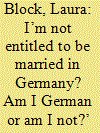

|
|
|
|
|
| Summary/Abstract |
The state interferes with the intimate spheres of families and couples via family migration policies, which have grown increasingly restrictive in many European countries. Mixed-status couples engaging in spousal migration develop coping strategies in order to adapt to hurdles and overcome them. This article explores the under-researched perspectives of sponsor spouses on (family) migration policies. When interacting with authorities, politicians or counselling services, the sponsors often react discursively, using arguments relating to human rights, citizenship, membership as well as gender and marriage/family norms. Based on a qualitative analysis of case dossiers of a German NGO counselling mixed-status couples, the article explores the narratives and strategies developed by the (mostly White) German citizen sponsors, thereby analysing the ways they ‘perform citizenship’ at the crossroads of migration control, marriage and family norms, and membership.
|
|
|
|
|
|
|
|
|
|
|
|
|
|
|
|
| 10 |
ID:
117932
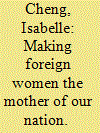

|
|
|
|
|
| Publication |
2013.
|
| Summary/Abstract |
Citizenship awarding is politicised. Conceiving female marriage migration as a national threat, Taiwan's citizenship legislation is consciously designed and purposefully utilised to achieve exclusion and assimilation. Driven by a nationalistic impetus, it shows how Taiwan imagines itself as a modern, prosperous and homogenous nation and projects upon the immigrant outsiders as a threat to its self-identity. Examined through immigrant women's lived experiences, this citizenship legislation is biased by gender, class and ethnicity. The implementation of the legislation is not only an example of symbolic politics but also banal nationalism realised at grassroots level in the private domain. Immigrant women's lived experiences show that exclusion and assimilation stemmed from banal nationalism is not just an operation of symbolic politics but is also enmeshed with their everyday life.
|
|
|
|
|
|
|
|
|
|
|
|
|
|
|
|
| 11 |
ID:
128278
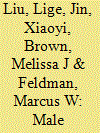

|
|
|
|
|
| Publication |
2014.
|
| Summary/Abstract |
Since the 1990s, inter-provincial female migration for marriage has become important in central and eastern rural China. Using survey data from X County in rural Anhui Province, we explore the arrangement of inter-provincial marriages, as well as the characteristics of husbands and wives, marital satisfaction and marital stability for these marriages. We find that inter-provincial marriage is an important option for local men to respond to the marriage squeeze and the increasing expense of marriage. It helps to relieve the shortage of marriageable women in the local marriage market. Because this kind of marriage is based on economic exchange, but not affection, it is often subject to a higher risk of marriage instability, and can lead to such illegal behaviors as marriage fraud and mercenary marriage.
|
|
|
|
|
|
|
|
|
|
|
|
|
|
|
|
| 12 |
ID:
097222


|
|
|
| 13 |
ID:
148289
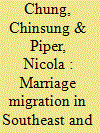

|
|
|
|
|
| Summary/Abstract |
Migration entails multi-faceted social transformations at various scales, in both countries of origin and destination as well as regionally and globally, implicating migrants and non-migrants alike. The act of migration turns migrants into objects of change as well as agents of change, individually and collectively. Marriage migration, as a sub-category of broader migration, involves both birth families in origin communities and those newly formed (or joined) in destination countries. The institution of the family is, therefore, particularly impacted in multiple ways.
|
|
|
|
|
|
|
|
|
|
|
|
|
|
|
|
| 14 |
ID:
148290


|
|
|
|
|
| Summary/Abstract |
This paper takes as its starting point the multidirectionality and multi-sitedness of change triggered by migration, especially in relation to gender and migrant precarity. More specifically, it interrogates four strands of the gendered migration debate related to marriage migration: various forms of precarity faced by migrant women and their implications in socio-economic and legal terms; changes to family patterns and social reproduction connected to marriage migration; social policies in origin and destination countries and their relevance to women’s unpaid care work duties; and the productive and reproductive functions involved in the creation of a precarity that leads to, and results, from marriage migration. It points to remaining gaps in knowledge and offers ideas for future lines of inquiry into marriage migration in general and in the context of Asia specifically.
|
|
|
|
|
|
|
|
|
|
|
|
|
|
|
|
| 15 |
ID:
148291
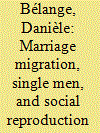

|
|
|
|
|
| Summary/Abstract |
This article analyzes the repercussions of marriage migration for Vietnamese communities of origin in two ways. Firstly, it argues that a life-course perspective and the concept of “care circulation” expand understandings of the implications of marriage migration for reproduction and care in countries of origin. Secondly, it documents how marriage migration unsettles reproduction and care patterns primarily because sending communities face difficulties in marrying their own sons to village women. The article is based on extensive ethnographic fieldwork conducted in 2012 in two regions of Vietnam particularly affected by international marriage migration and is informed by other projects conducted since the mid-2000s. Results suggest that migration among young women who migrate without the intention of return bears a different significance for gender and development than migration among women who have moved further along in their life course. Marriage migration in Vietnam takes place at a critical juncture of the life course when gender power relations may be reconfigured in the country of origin. A focus on men and their families in migrants’ communities of origin provides new insight. In sum, a life-course perspective broadens the scope of the relationship between migration, gender inequalities, reproduction, and care.
|
|
|
|
|
|
|
|
|
|
|
|
|
|
|
|
| 16 |
ID:
178787
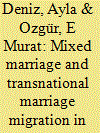

|
|
|
|
|
| Summary/Abstract |
Since the early 1990s, marriages between Russian women and Turkish men have become more common. Today, Russian brides have the top place among marriage migrants in Turkey. This study aims to reveal the actors, places, motivations and mechanisms of these marriages, which have changed the social fabric significantly. The study emphasizes the direct effects of political-economic structures on mixed marriage and marriage migrations. In this study, in-depth interviews were held with Russian brides and their Turkish husbands in İstanbul and Antalya. The results show that this 30-year-old marriage pattern has evolved substantially over time, mirroring the two countries’ political economy, and has created its own system that diverges from the global trend in several ways.
|
|
|
|
|
|
|
|
|
|
|
|
|
|
|
|
| 17 |
ID:
120788


|
|
|
|
|
| Publication |
2013.
|
| Summary/Abstract |
The discussion of marriage migration in Denmark primarily has focused on citizens of immigrant descent ('New Danes') who marry partners from their ancestral homeland (often Turkey or Pakistan). This type of marriage migration was the target of the strict Danish family reunification policy instituted in 2002. This article examines the genealogy of the morality underpinning the family reunification policies and asks whether the rules actually promote this moral agenda or have unintended consequences. Empirically, I shift the focus from immigrant Danes to native Danes who marry Cubans. Finally, while little attention is paid to the non-western country involved, transnational marriages always involve two nations. This article investigates how state policies on both ends of this migration trajectory shape moral-territorial borders that transnational couples navigate.
|
|
|
|
|
|
|
|
|
|
|
|
|
|
|
|
| 18 |
ID:
117933


|
|
|
|
|
| Publication |
2013.
|
| Summary/Abstract |
By investigating the regulation differentials between Chinese spouses and foreign spouses in Taiwan's marital immigration program, this article shows how a restrictive border policy reflects the characteristics of Taiwan's contemporary nationalism. This article notes that the similarities in language, culture and ethnicity are not key elements in the construction of Taiwan's contemporary nationalism. Instead, the uncertain condition of sovereign identity constitutes the nationalist agenda in Taiwan. Taiwan's nationalism is accordingly contingent upon the discursive externality of a Chinese spouse. The discrimination against Chinese spouses is primarily politically motivated.
|
|
|
|
|
|
|
|
|
|
|
|
|
|
|
|
| 19 |
ID:
130731


|
|
|
|
|
| Publication |
2014.
|
| Summary/Abstract |
The gendered character of India's fertility decline has attracted considerable academic attention. In this paper, I offer a critique of the arguments of some demographers about the linkages between dowry, daughter aversion and the marriage squeeze that predict that increasing shortages of marriageable women will result in declines in dowry. I argue that such economistic readings seriously oversimplify the complexities of marriage arrangement 'on the ground' in contemporary India. Further, whilst one aspect of dowry might relate to the supply and demand of brides and grooms, dowry and daughter aversion are not simply outcomes of demographics alone. First, marriage migration is crucial in understanding daughter aversion. Second, dowry is not just a matter of marriage and kinship practices. Dowry is a polyvalent institution that also connects with conspicuous display in status competition in a hierarchical society and with people's rising aspirations to possess consumer goods within the wider context of contemporary India's rapidly changing political economy. Crucially, marriage migration, status competition and consumerism do not necessarily push in the same direction as the demographics of the marriage squeeze might imply when it comes to dowry and daughter aversion.
|
|
|
|
|
|
|
|
|
|
|
|
|
|
|
|
|
|
|
|
|